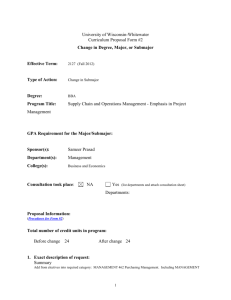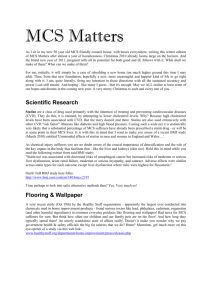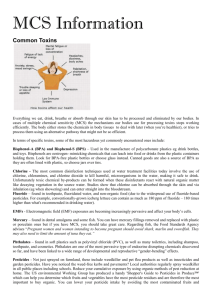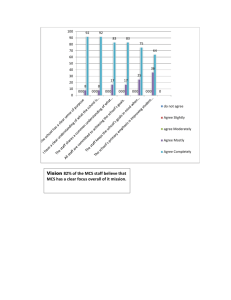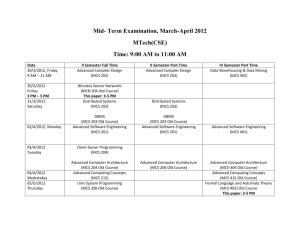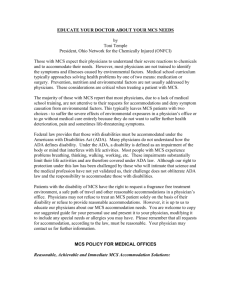Claim
advertisement
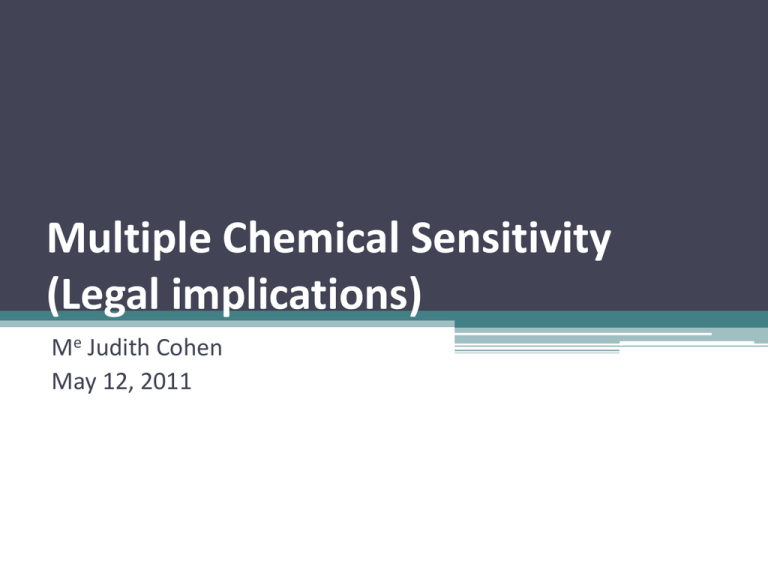
Multiple Chemical Sensitivity (Legal implications) Me Judith Cohen May 12, 2011 MCS and Labor Relations Moreau et Commission scolaire de Val-d’Or c. Commission des lésions professionnelles (2002) Claim Appeal to CLP of decision of the CSST which confirmed the decision that the appellant did not suffer from professional injury and therefore has no right to compensation. Recognition Initial diagnosis indicated dry rhinitis and dry irritative laryngitis. Complementary report indicated mucus hypersensitivity. Both were attributed to MCS. Contradictory reports linked his symptoms to allergies or more likely to a depressive mental state – the fact that the symptoms did not improve after employee stopped working suggest an unlikely relation between the two. Continued… Moreau et Commission scolaire de Val-d’Or c. Commission des lésions professionnelles (2002) Decision Confirmed presence of occupational disease. Motives: • preponderant medical and factual proof, • his prolonged exposure to chemicals (only at the work place), • the absence of previous personal or psychological illnesses, • and the flaring up of MCS symptoms when exposed to similar chemicals. NB Judgement which officially recognized MCS as a compensable disease. Lemoy et Litho Associates Ltée c. Commission des lésions professionnelles (2003) Claim Demanded compensation for occupational disease due to exposure to toluene in print shop. Recognition MCS and rhinitis caused by chemical sensitivity were the accepted diagnosis, even though the chemical substance did not exceed the regulatory exposure limits – made clear that workers exposure to low level of toluene triggered her disease. Continued… Lemoy et Litho Associates Ltée c. Commission des lésions professionnelles (2003) Decision Confirmation by 6 doctors leads to acceptance of claim. NB CLP begins to acknowledge that a medical controversy regarding the diagnosis of MCSS can no longer justify refusal of a claim, as was the previous practice (see Rolko: 1994). Creighton v. Workplace Health, Safety and Compensation Commission (2009) Claim Appeal of a decision of the Appeals Tribunal which denied her appeal from a refusal by the Commission to compensate her for particular treatments, products, and expenses which she believes are necessary. Recognition On March 27, 2002 the Appeals Tribunal ordered the Commission to accept her claim for disablement from employment for “multiple chemical sensitivity” and determined a start date of injury as early as August 8, 1995. Panel acknowledges existence of condition but does not find it necessary to determine or justify a prescient precise diagnosis. Common-sense understanding that diesel exhaust is harmful to ones health which were present in appellants workplace which has effectively forced her from her workplace and prevented her from going back. Additionally her condition has improved over the past 3 years . Continued… Creighton v. Workplace Health, Safety and Compensation Commission (2009) Compensation In total, Ms. Creighton received compensation of approximately $37,000 for the following medical aid from April 1998 to June 30, 2003: • • • • Physiotherapy until December 15, 2002; Acupuncture Therapy until April 18, 2003; Chiropractic treatment until June 26, 2003; I.V. supplements and various natural health products prescribed by Dr. Reid until June 30, 2003. From June 30, 2003 forward Ms. Creighton sought various lifestyle modifications and medical treatments; Commission advised that it would not pay for lifestyle modifications for her and it would be unable to continue paying for treatment. Decision Appeal denied, upon absence of evidence of medical effectiveness for the continuation of treatment not generally approved. Workers’ Compensation Board (P.E.I.) v. Cormier (2010) Claim Board sought to appeal decision of the Workers Compensation Appeal Tribunal (WCAT) which awarded compensation to respondent. Recognition After review, WCAT concluded that the evidence showed that the respondent's health issues arose out of, and in the course of, her employment and therefore were compensable by the Board. Decision Appeal allowed based on the fact that the issue at hand is an arguable one. Serigraffiti Inc c. Commission des lésions professionnelles (2001) Claim Employer seeks to infirm pervious decision and to declare the absence of occupational injury. Recognition Environmental evaluation conducted. Repeated exposure to solvents in work environment cited as cause of aggravation of migraines (despite genetic predisposition), symptoms which reappeared upon new exposure, and abated with absence from work environment. Decision Appeal rejected. Rolko et Canada (Department of National Defense) (1994) Claim Demands Appeals board of CLP to overturn the decision of the review board and to declare that he suffered an occupational disease (MCS). Recognition Review board argued that there is no scientific evidence to support a diagnosis of MCS this opinion considered out-dated, as the illness has been accepted and recognized by various boards and commissions However, appellants symptoms differed from medically and classically recognized symptoms resulting from exposure to ethylene glycol (toxin in question) failure to establish causal link. Decision Reject Rolkos’ appeal. MCS and the Canadian Human Rights Act Harris v. Camosun College (2000) Claim Complainant alleges Camosun College discriminated against her by not accommodating her physical disability, referred to her as MCS and environmental sensitivities, to the point of undue hardship (in violation of 15(2) of the Canadian Human Rights Act. Recognition No substantiated diagnosis was deposited. Later tests revealed allergies to animals and dust, neither of which established a link with the Respondents environment. Decision Reject Complainants claim based on absence of proof. Guibord v. Canada (Treasury Board-Transport Canada) (1996) Claim Application for judicial review of the decision of the Public Service Staff Relations Board holding that the Respondent did not fail in its duty to accommodate the Applicant in refusing to allow her to return to her job on a part-time basis. Recognition Exposure to chemical carpet cleanser in applicants work area and subsequent blood tests indicated environmental sensitivity. Decision Reject Applicants application on basis that employer did not fail in their duty to accommodate applicant, as they offered a reasonable alternative (alternate employment with same level and money at another location). The fact that a relocation could be detrimental to Applicants health was not disclosed, so she failed in her duty. OPSEU v. Ontario (Ministry of Correctional Services) (2003) Claim Alleges that employer failed to properly accommodate him by providing a smoke-free environment, which aggravated his asthma (with a particular sensitivity to cigarette smoke). Recognition Medical notes supported his sensitivity to cigarette smoke. Decision Confirm applicants claim that employer failed to accommodate him by repeatedly assigning him to areas and tasks that put him in direct contact with cigarette smoke.




